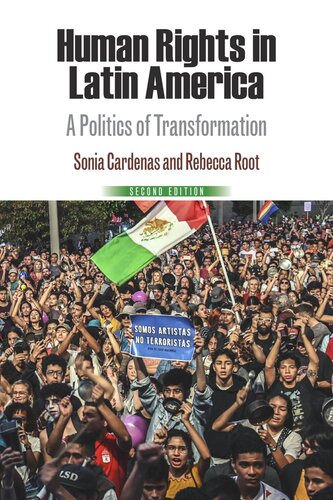

Most ebook files are in PDF format, so you can easily read them using various software such as Foxit Reader or directly on the Google Chrome browser.
Some ebook files are released by publishers in other formats such as .awz, .mobi, .epub, .fb2, etc. You may need to install specific software to read these formats on mobile/PC, such as Calibre.
Please read the tutorial at this link: https://ebookbell.com/faq
We offer FREE conversion to the popular formats you request; however, this may take some time. Therefore, right after payment, please email us, and we will try to provide the service as quickly as possible.
For some exceptional file formats or broken links (if any), please refrain from opening any disputes. Instead, email us first, and we will try to assist within a maximum of 6 hours.
EbookBell Team

4.1
40 reviewsThis second edition of Human Rights in Latin America explores the dynamics underlying a vast range of human rights initiatives. Ample supplementary resources—including discussion questions, interdisciplinary reading lists, filmographies, and online resources—make this an especially valuable text for use in the classroom.
For decades, Latin America has been plagued by civil wars, dictatorships, torture, legacies of colonialism, racism, and inequality. The region has also experienced dramatic—if uneven—human rights improvements, shedding light on the politics of transformation. The accounts of how Latin America’s people have dealt with the persistent threats to their fundamental rights offer lessons for people around the world.
Human Rights in Latin America provides a comprehensive introduction to the human rights issues facing an area that constitutes more than half of the Western Hemisphere. This second edition brings together regional case studies and thematic chapters to explore cutting-edge issues and developments in the field. From historical accounts of abuse to successful transnational campaigns and legal battles, Human Rights in Latin America explores the dynamics underlying a vast range of human rights initiatives. In addition to surveying the roles of the United States, relatives of the disappeared, and truth commissions, Sonia Cardenas and Rebecca Root cover newer ground in addressing the colonial and ideological underpinnings of human rights abuses, emerging campaigns for gender and sexuality rights, and regional dynamics relating to the International Criminal Court.
Engagingly written and fully illustrated, Human Rights in Latin America fills an important niche among human rights and Latin American textbooks. Ample supplementary resources—including discussion questions, interdisciplinary reading lists, filmographies, online resources, internship opportunities, and instructor assignments—make this an especially valuable text for use in human rights courses.